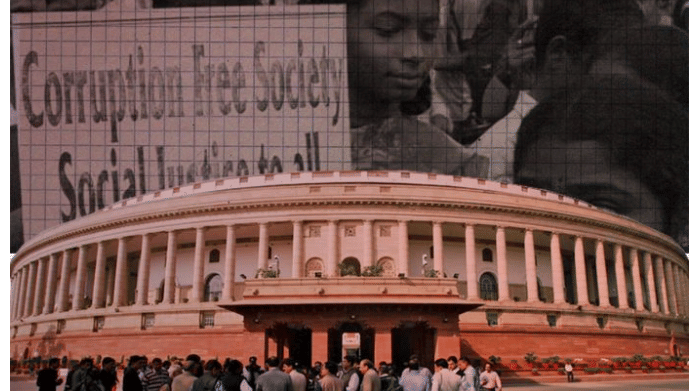Thank you dear subscribers, we are overwhelmed with your response.
Your Turn is a unique section from ThePrint featuring points of view from its subscribers. If you are a subscriber, have a point of view, please send it to us. If not, do subscribe here: https://theprint.in/subscribe/
Lately there has been both a subtle and overt attempt to run down certain important constitutional institutions of India by not only the opposition political parties,but people on social media (SM) and other platforms. Benign and even anodyne as it may appear, l argue that this can be more sinister or menacing than it appears and needs to be expeditiously addresed. Since these institutions safeguard both the state and its people, any debate around rights,duties or responsibilities must be approached with care…it does also run the risk of its advocates being seen as partisan. However, even at the cost of being labelled as an adherent of one ideology or the other, it does become important to speak up, if doing so reinforces trust in the very institutions that preserve the nation’s unity and strength.
We have in our polity and legislature, people with limited interest in rectitude and patriotism. Most only aspire to higher office, promotion of family and pecuniary gain. Even as their rights and privileges are protected, given power,pelf and wealth, it is our vast population which has a much higher stake in the sanctity and solidity of these institutions.
Several arms of the Executive and Legislative have been increasingly attacked and even sought to be emaciated and stigmatised by political parties and even people. The Election Commission (EC), Enforcement Directorate (ED), NITI Aayog, NCERT, just to name a few, have faced the wrath of the polity and community. Depending on which side of the political divide one stands, they are either vilified or glorified…mostly however the former. In a transparent system, increasingly open to public scrutiny, every action (or lack of it) is clearly visible, minutely dissected and astutely analysed by experts and laymen with equal felicity. The deleterious effect of propaganda and disinformation in a nation with vast access to SM, can be most damaging. Despite the cliched phrase “ye to public hai sab janti hai” , l would imagine that not everyone knows everything and often gets swayed by hype on SM.
And herein lies the rub. Just to take one example of the EC. If, as the opposition claims: vote chor gaddi chhod (‘vote stealer, quit your post’), were to find traction and resonance with the masses, it could lead to anarchy. If the power of the ballot, our democracy’s biggest strength, were to come into question, it could shake the country asunder and wreak havoc. Instead of a measured,mature response…and an investigation into the allegations, the EC and its top functionaries get provoked, ask for affidavits and generally resort to rhetoric. Does this restore or erode public confidence? I leave the reader to discern.
The ED has often been accused of being an instrument of the govt to intimidate and harass the opposition. Without going into the merits of the allegation, l would posit to the citizenry: as an agency of the govt with constitutional sanctity, is the constant ‘activism’ (as opposed to denunciation due to the govt’s policies/ practices), seen as eroding the worth of this agency? Probably yes, given its constant vilification. On its part, the ED too has been somewhat opaque and not adequately responsive. Its alleged weaponisation by the powers that be probably casts doubt as to its objectivity and transparency.
One can give several other examples of how our institutions are constantly imperiled. Reasons for this range from political, social, economic and even personal. With every hit that any institution takes, our collective strength as a nation is dented and weakened. When seen alongside a less than perfect external environment – US tariffs, hostility with China, Pak…and now even Bangladesh, a disturbed Nepal, the ongoing conflicts in the Middle East and Ukraine, we are not looking at a rosy picture. India has faced crises, including constitutional cataclysms, such as the Emergency in 1975; however, dissemination of information (and equally misinformation) was not as quick and rampant as it is today. Earlier, public anger often dissipated or abated by the time bad news reached all. We now live in an age of instant bytes, opinion, accusations and counteraccusations. The truism “a lie has already travelled half the world, while the truth is still putting on its shoes”, attributed to Mark Twain, never held greater relevance than it does today.
In such a scenario, it is incumbent and even binding on us, each in their small way, to ensure that our institutions stand strong and tall, and not bend to extant political dispensation or bow to the insinuations of the opposition. This cannot be left to the legislative or judiciary alone. Every citizen has a role to play. Noted author and journalist Sydney J Harris put it most succinctly when he wrote: “The difference between patriotism and nationalism is that the patriot is proud of his country for what it does and the nationalist is proud of his country no matter what it does…..”. In a vast, chaotic democracy like ours, things will never be perfect. Let us be patriots who are not blind to our follies, but who would do and give their best to set the wrongs right. It is in this spirit that l argue that our institutions cannot become the arena for political battles.Their honour, dignity and prestige are most critical…even cardinal to our existence.
These pieces are being published as they have been received – they have not been edited/fact-checked by ThePrint.


